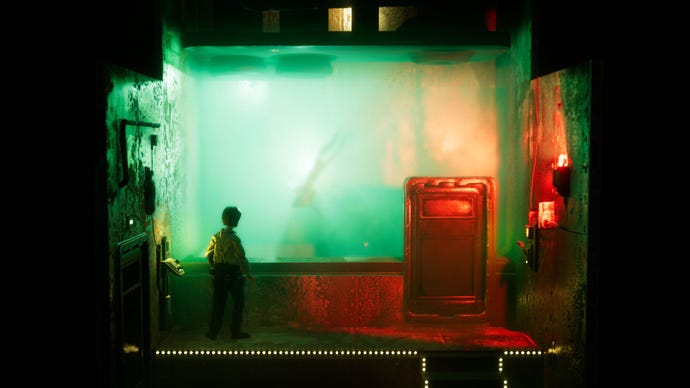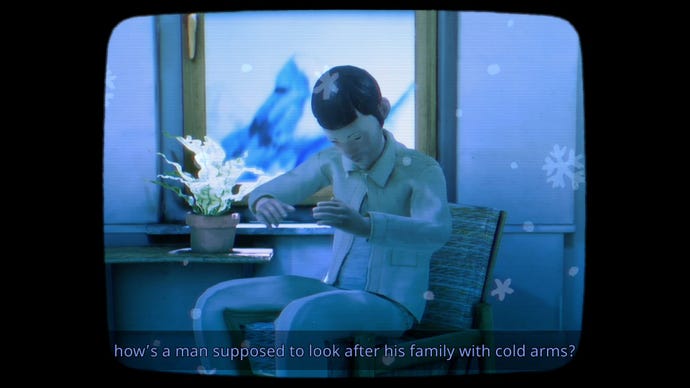Harold Halibut has the feel of a game that should last 4-6 hours but inexplicably lasts 10-12. There’s no way to explain that, not only because it’s a protracted game with little interaction – the game is really just a story delivery mechanism; a TV show you can walk around in, where you advance the story by pressing A – but also because it’s a game made with hand-crafted miniatures. It’s an animated sci-fi dollhouse under the sea that he describes as “a cross between a game and a stop-motion movie,” and if my game needed that much work, I’d edit the script. Then again, there aren’t that many locations, so you might really want to show them off.
I love miniatures, and Harold Halibut is lovely. It’s also a lovely story about finding yourself and your place in the world, even if that place is unexpected, and having the courage to take that step. There are unexpected, silly parts and weird parts where people start singing and parts where you read undelivered letters. But at the same time, I completely understand why some people might find it tedious.
Manage your cookie settings
You play as the titular Harold. He’s a part-time worker on the Fedora, a former colony ship that left the seemingly doomed Earth and crashed on an ocean planet. The locals have dismantled the Fedora and made it into a kind of cute Rapture from BioShock – there are different districts for work, play, study, etc., and you move around in a network of tubes. The detail is sometimes incredibly great, both detailed and strange, and the way some sequences are shot is almost cinematic in a way that many game directors think they are but really aren’t.
The vibe of Fedora is a sort of 70s sci-fi with glowing colors, everything a bit tacky and improvised. Every time you enter or leave the neighborhood, you get sprayed with disinfectant from an venerable metal shower head. It’s a lot more to look at than it should have been. I sat in the miniature living room in the lab where Harold lives and watched in-universe commercials, one of which was for a ski shop (the ski shop’s existence is both hilarious and crucial to the story in ways I won’t explain).
Harold has a sort of PDA that gives him a to-do list and where he can receive messages from other characters (the game sometimes skips a few weeks and you’ll have a ton of modern messages when that happens. They’re adorable!). He also has a notebook where he draws things that happen to him – it’s later implied that he’s dyslexic or something. The drawings are another way you can see what Harold really thinks about the world when he doesn’t always express it differently.Image Source: Rock and Paper Shotgun/Slow Bros.
The plot is driven by a few things. First, Fedora is facing an energy crisis and has been for some time, which is not great when you live underwater. At the same time, a once-in-a-lifetime window opens up to get off the planet without being hit by a solar flare. On the third hand, the All Water Company (the company that has become Fedora’s de facto government) seems to have secrets and is at odds with a secret rebel group. And finally, Harold finds an aquatic inhabitant hanging around in one of the filtration systems. Hazza ends up at the forefront of most of this, as he is the lab assistant to head scientist Jeanne Mareaux, although he is so passive that everyone else just asks him to do something too. And he does it!
Katharine found this frustrating in her preview, but I really liked the fact that Harold was being joked about by some of the coworkers. Harold Halibut is not an RPG, you can’t be the Harold you want to see in the world. You are a passenger on Harold’s journey, and it is heartwarming and quietly triumphant to see Harold’s worth gradually recognized by those around him and by Harold himself, as he helps so many people in Fedora in so many ways – and also develops modern, close and emotionally resonant relationships. Harold begins to express irritation with the way his ex talks to him and gives advice to others instead of agreeing with them. Eventually he feels confident enough to make a gigantic decision about his life, even shouting at Mareaux to be heard before he lets her speak and ignores him.
The characters are oddballs, from a school teacher who wears a silk robe all the time to a store owner with a secret identity to a group of identical All Water employees who are concerned about the black sheep of the family (who wants to sell sizzling dogs). But while the specifics of their problems are different from the norm, they are recognizable in the basic themes: family, love, loss, anxiety, the desire to belong.



But Harold Halibut doesn’t shy away from the weird. At one point early on, Harold bursts into a musical number about wanting more out of life, one of several surreal sequences that bend reality on Fedora. There are montages that are a bit like Rocky or Scarface, but Harold does useful things and meets people. He joins an unlikely group of revolutionaries to spy on the head of All Water and tries to infiltrate her office while she’s playing a cover of Bella Ciao; he tries out a miniature artificial ski slope; there’s an achievement for watching a mime perform a strange one-woman show. While most of the game takes place on Fedora, Harold also ventures into another community that’s full of strange little interactions and is an organic, colorful place that’s the polar opposite of Fedora. It’s amusing, charming, and crafted with great attention to detail in the setting and writing.
At the same time, Harold Halibut is very slow-paced. You’ll mostly be talking to people, and then, at their request, you’ll go to talk to someone else, and you’ll get to know the various stairs and hallways and Harold’s odd little run. There are no puzzles, just conversations and curiosity, and 10 hours of that starts to feel like a long time. No one would let Wes Anderson make a 10-hour movie for that very reason. I think they could have cut a decent chunk out of Harold Halibut, especially the early chapters, and come out with something lighter without being more snarky. But even as it is, the ending is a good ending to a sweet story, with lots of chuckles and surprises along the way.
This review is based on a copy of the game provided by the developer.

